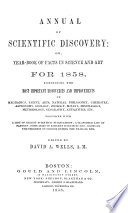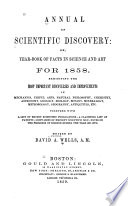 ... by means of sinking weights, and our watches by means of the tension of springs. A weight which lies on the ground, an elastic spring which is without tension, can produce no effects : to obtain such we must first raise the weight or impart tension... ... by means of sinking weights, and our watches by means of the tension of springs. A weight which lies on the ground, an elastic spring which is without tension, can produce no effects : to obtain such we must first raise the weight or impart tension...  The American Journal of Science and Arts - Page 1861857Full view The American Journal of Science and Arts - Page 1861857Full view - About this book
 | 1858 - 448 pages
...we must first raise the weight or impart tension to the spring, which is accomplished when we wind up our clocks and watches. The man who winds the clock...the spring a certain amount of power, and exactly БО much as is thus communicated is gradually given out again during the following twenty-four hours,... | |
 | 1859 - 448 pages
...we must first raise the weight or impart tension to the spring, which is accomplished when we wind up our clocks and watches. The man who winds the clock...watch communicates to the weight or to the spring а certain amount of power, and exactly so much as is thus communicated is gradually given out again... | |
 | John Timbs - 1869 - 280 pages
...we must first raise the weight or impart tension to the spring, which is accomplished when we wind up our clocks and watches. The man who winds the clock...communicated is gradually given out again during the twenty-four hours, the original force being thus slowly consumed to overcome the friction of the wheels... | |
 | Hermann Ludwig F. von Helmholtz - 1873 - 424 pages
...we must first raise the weight or impart tension to the spring, which is accomplished when we wind up our clocks and watches. The man who winds the clock...from the air. The wheelwork of the clock therefore developes M no working force, which was not previously communicated to it, but simply distributes the... | |
 | Hermann von Helmholtz - 1873 - 432 pages
...we must first raise the weight or impart tension to the spring, which is accomplished when we wind up our clocks and watches. The man who winds the clock...from the air. The wheelwork of the clock therefore developes no working force, which was not previously communicated to it, but simply distributes the... | |
 | Helmholtz - 1873 - 452 pages
...we must first raise the weight or impart tension to the spring, which is accomplished when we wind up our clocks and watches. The man who winds the clock...resistance which the pendulum encounters from the air. The vvheelwork of the clock therefore developes no working force, which was not previously communicated,... | |
 | Hermann von Helmholtz - 1873 - 432 pages
...we must first raise the weight or impart tension to the spring, which is accomplished when we wind up our clocks and watches. The man who winds the clock...the spring a certain amount of power, and exactly go much as is thus communicated is gradually given out again during the following twenty-four hours,... | |
 | Augustus Fendler - 1874 - 172 pages
...fall. Yet in spite of all this they assert : " The man who winds the clock communicates to the weight a certain amount of power, and exactly so much as...is gradually given out again during the following 24 hours." " And as surely as the force which moves a clock's hands is derived from the arm which winds... | |
 | William S. Knickerbocker - 1927 - 410 pages
...we must first raise the weight or impart tension to the spring, which is accomplished when we wind up our clocks and watches. The man who winds the clock...twenty-four hours, the original force being thus slowly 280 CLASSICS OF MODERN SCIENCE consumed to overcome the friction of the wheels and the resistance whiqh... | |
 | Hermann von Helmholtz - 1995 - 446 pages
...we must first raise the weight or impart tension to the spring, which is accomplished when we wind up our clocks and watches. The man who winds the clock...from the air. The wheelwork of the clock therefore develops no working force, which was not previously communicated to it, but simply distributes the... | |
| |